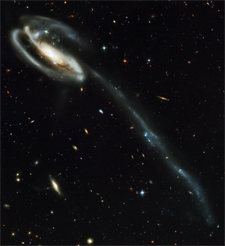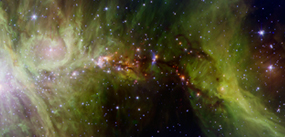Syllabus
ASTRONOMY 301
INTRODUCTION TO ASTRONOMY
https://www.as.utexas.edu/astronomy/education/spring11/dinerstein/301.html
|
SECTION: |
Unique No. 48215, Spring 2011 |
|
CLASS MEETINGS: |
Tu & Th 9:30 – 10:45 AM, Welch 3.502 |
|
INSTRUCTOR: |
Prof. Harriet Dinerstein, (512) 471-3449 |
|
OFFICE: |
RLM 16.324, SE corner of Dean Keeton & Speedway |
|
OFFICE HOURS: |
TBA |
|
E-MAIL: |
TEACHING ASSISTANTS, OFFICE HOURS, AND HELP SESSIONS:
|
Emily Bevins, Observatory |
Bohua Li, RLM 16.212 |
HELP SESSIONS: Wed. 4:30 – 5:30 PM, RLM 15.216B (before exams & HWs)

Globular Cluster NGC 6397 [STScI]
COURSE DESCRIPTION: The goal of this course is to introduce you to our modern picture of the universe, from our own Solar System to stars, galaxies, and the largest scales of space and time. Fitting all this material into one semester will be a bit of a whirlwind, but as you will see, many principles and themes repeat themselves from smaller to much larger scales. We will also show you how astronomers are able to figure out such seemingly impossible-to-know things as the distances to the stars, masses of planets orbiting other stars, and what the universe looked like long ago.
LEVEL OF MATH REQUIRED: Since you are not a science or engineering major (if you are, you should probably be taking Ast 307 rather than 301), our main emphasis will be on conceptual understanding. However, in order to express the vastness of space or smallness of subatomic particles, we will need to use exponential notation. Also, ratios and proportionality are helpful for expressing and understanding the relationships between various properties. You will be expected to carry out a few mathematical calculations, but we will gladly provide help if needed (see below).
TEXTBOOK: The textbook is "The Cosmic Perspective," by Bennett,
Donahue, Schneider, and Voit. The current edition is the Sixth edition. You can probably get away with using a slightly older edition,
such as the Fifth or Fourth. However, if you buy a used copy, you will have to separately purchase access to the textbook's website,
www.masteringastronomy.com if you want access to their online self-study
tools - which I highly recommend. These include animations, tutorials, and quizzes. Stand-alone website access currently
costs $38.50, which somewhat offsets your savings from buying a used book. Another option is to buy the eBook plus the website
access, which are bundled for a price of $71.50. Find out your options at
http://www.masteringastronomy.com/site/product/for-students.html.
Note: Be sure to get a full-length edition called "The Cosmic Perspective." Do not choose a version entitled "The Essential Cosmic Perspective," "The Cosmic Perspective: Stars, Galaxies, and Cosmology," or "The Cosmic Perspective: The Solar System." These are abbreviated editions lacking some required material.
IMPORTANT DATES FOR THE SPRING 2011 SEMESTER:
First class meeting: Tues., Jan. 18 (first day of UT classes)
Last day of the official add/drop period: Fri., Jan. 21
Last day to drop a class with a possible refund: Wed., Feb. 2
Last day to drop a class with an automatic “Q”: Mon., Feb. 13
Last day to drop a class (with your Dean’s approval)
except for non-academic
reasons, or to change between
CR/F & letter grade: Mon., Mar. 28
Last class meeting: Thurs., May 5

Tadpole Galaxy [STScI]
INSTRUCTOR POLICIES AND EXPECTATIONS: I believe students learn best by engaging actively and frequently with the material, spacing their studying over the semester. This course is designed accordingly. This is not a class in which you can expect to earn a good grade – or even get credit! – just by acing a couple of exams. There will be a number of opportunities for demonstrating effort and understanding, spaced out over the semester. You will be expected to prepare for class by reading the assigned chapters/sections ahead of time, and this will be documented through frequent pop quizzes. Finally, to be courteous to the instructor and your classmates, you are expected to arrive at class on time, turn off the sound on your cell phone (and avoid cell phone use including texting during class), and minimize other distracting activities such as loud snoring and conversations with your neighbors.
OBTAINING INFORMATION: The primary sources for information and updates about class activities, homework due dates, dates of and material to be covered on exams, etc., are announcements made in class, and the class website (given at the top of this syllabus). It is your responsibility to stay informed about important events from these sources or by asking a classmate. For example, it is not feasible for us to provide a detailed reprise of a missed class to an individual student. We will use Blackboard to provide access to your grades, but other materials – including fast-breaking news – will often be posted on the Astronomy site rather than Blackboard.
GETTING HELP: The instructor and both T.A.'s will hold weekly office hours, and there will be help sessions most Wednesday afternoons, whenever there is an upcoming exam or homework due date. These will be in RLM 15.216B, the Astronomy classroom. It will also possible to contact the instructor or a T.A. by email. We hope that many of your questions will be answered through the postings on the class website, but if you don’t find the answer to your question there, please call on us for information or help.
SELECTED TEXTBOOK SECTIONS: Fifteen weeks is too short a time to cover the entire textbook, so we will be selective. At minimum, we will include: chs. 1-3, 4-8, 12-15, 17-20, and parts of 22 & 23. If time permits, we may also cover some of chs. 10, 16, 21, and more of chs. 22 & 23.
TENTATIVE SCHEDULE OF READINGS AND EXAMS: (subject to revision)
|
Part I: Developing Perspective (ch. 1 – 3) |
Jan. 18 – 27 |
|
Part II: Key Concepts for Astronomy (ch. 4 – 6) |
Jan. 27 – Feb. 15 |
|
Exam 1, on chs. 1 - 5 |
Thurs., Feb. 10 |
|
Part III: Learning From Other Worlds (ch. 7, 8, 12, 13) |
Feb. 15 – Mar. 1 |
|
Exam 2, on chs. 6 – 8, 12 – 13 |
Thurs., Mar. 3 |
|
Begin Part V: The Sun (ch. 14) |
Tues., Mar. 8 |
|
Make-up exam for first half of the semester |
Thurs., Mar. 10 |
|
Part V: Stars (ch. 15, 17 – 18) |
Mar. 22 – Apr. 5 |
|
Exam 3 – on chs. 14 – 15, 17 – 18 |
Thurs., Apr. 7 |
|
Part VI: Galaxies & Beyond (ch. 19, 20, 22, 23) |
Apr. 12 – May 3 |
|
Exam 4 – on covered material in Part VI |
Thurs., Apr. 28 |
|
Make-up exam for second half of semester |
Thurs., May 5 |
COURSEWORK AND GRADING: Course grades are based on a point system. There are no quotas for "A's" or "B's." Grades will be based solely on your own performance. Detailed records will be kept, updated, and accessible online via Blackboard. The semester grade will be determined by the following:
In-class exams - (60%) Multiple choice format (machine-graded). Four exams, counting 15% each. (They will not take a full class period.)
***Make-Up Policy: I do not give customized make-ups for missed exams, even for valid reasons such as documented illnesses, personal emergencies, or conflicts with other academic or athletic commitments. Instead, a student who misses an exam must take the corresponding make-up exam for that half of the semester; see schedule above. However, these make-up exams also provide everyone with the opportunity for a "re-take" for a potential improved score.
Short quizzes - (15%) Frequent short (10-minute) essay-format quizzes will be given on previously covered material or (advance) assigned reading of the day. These will usually (but not always!) be given on Tuesdays. Quiz credits will be cumulative, up to a maximum of 15 points; however, no more than 10 points may be earned in a single half of the semester.
Homework - (15%) Up to 8 homeworks will be assigned and graded; depending on how many there are, the lowest 1 or 2 scores will be dropped.
Participation - (10%) Various activities including individual "answer polls" or worked-out problems will be recorded as participation. Roughly 80% of the scheduled activities must be completed in order to earn the full 10% credit. Alternatively, up to 2 participation points may be earned by attending one of the departmental Star Parties (on a Wednesday, Friday, or Saturday evening during the semester, see http://outreach.as.utexas.edu/public/viewing.html for more information), or an approved Public Lecture. Documentation, in the form of a Star Party attendance slip or brief write-up, will be required to receive credit.

Orion Nebula PRC95-45 [STScI]
ACADEMIC INTEGRITY: As you know, the University of Texas has an honor code regarding scholastic integrity and academic dishonesty. You are responsible for knowing and following these standards. Cheating on exams will not be tolerated, nor will copying on homework assignments. While you are allowed and even encouraged to discuss concepts related to homework problems with fellow students, TA’s, and the instructor, the final product you turn in must be your own work. In cases of duplicated papers, neither student will receive credit. We may also impose more significant penalties, depending on the circumstances, not excluding a major impact on the course grade (or credit) or a report to the Dean of Students. For more information, go to http://deanofstudents.utexas.edu/sjs/index.php and click on the link "Academic Integrity" on the left-column menu.
STUDENTS WITH DISABILITIES: Upon request, the University of Texas at Austin provides appropriate academic adjustments for qualified students with disabilities. Contact the Office of the Dean of Students at 471-6259, or (TTY) 471-4641, or via email to ssd@uts.cc.utexas.edu or see http://deanofstudents.utexas.edu/ssd/.
SPECIAL EVENTS: The Astronomy Department offers evening Star Parties (viewing through small telescopes) on campus several days a week. Wednesday Star Parties are held on the roof of RLM; Friday and Saturday nights are at Painter Hall. If you are seeking participation credit (see above), you must obtain a signed slip, with your name written on it, from the person in charge. Note: Star parties are held only when weather permits, and are cancelled when it’s too cloudy to see stars; do not count on getting all of your Star Party credit in the last week of the semester, since late spring is a usually a pretty rainy season in Austin! Details of times and locations are posted at http://outreach.as.utexas.edu/public/viewing.html.
DEPARTMENTAL INFORMATION: If issues arise during the semester that cannot be resolved with the instructor or TA, you may contact the Chair of the Undergraduate Studies Committee, Prof. Don Winget (471-3404 or dew@astro.as.utexas.edu), or the Chair of the Department, Prof. Neal Evans (471-3302, chair@astro.as.utexas.edu). More information can be found in the, “Memo to Undergraduate Astronomy Students,” posted at https://www.as.utexas.edu/astronomy/education/courses.html (item numbered 1 at the top of semester course list).

Professor
RLM 16.324 · (512) 471-3449 · email
Office Hours
TBA
TA
Mimi Song
TA
Bohua Li
HELP SESSIONS
Wed. 4:30 – 5:30 PM, RLM 15.216B
(before exams & HWs)